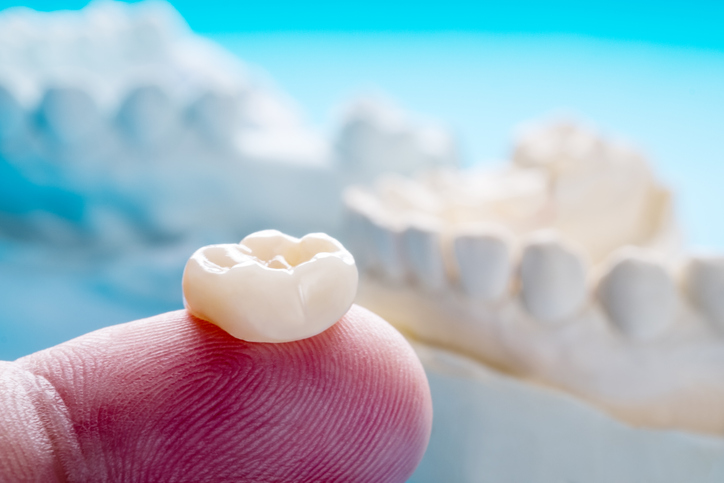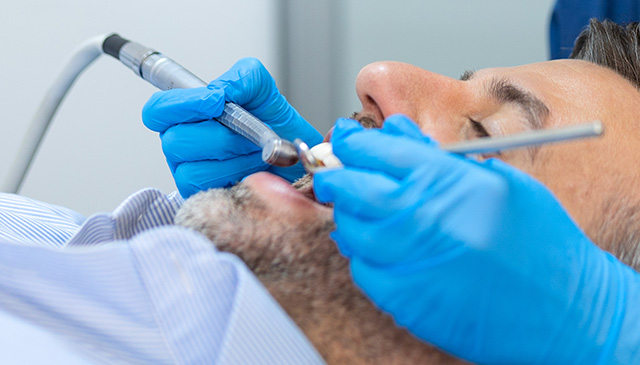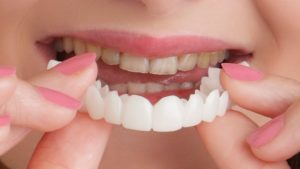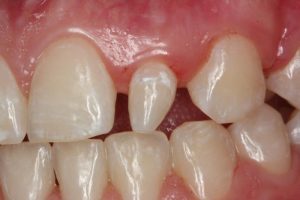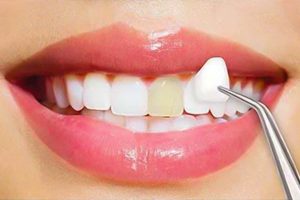I had a CEREC crown placed. However, it has come out several times within the last year. Finally, after the fourth time, I consulted a different dentist, who replaced the crown with a zirconia porcelain crown, but it, too, has come out several times.
The dentist suggested a full porcelain crown, stating that the cement was adhering to my tooth, but not the crown. He indicated that the all-porcelain crown is rough underneath and would, therefore, bond to the cement more effectively.
Why does my crown keep falling off? I’m unsure of what my next step should be, but I am tired of the trouble these crowns have caused. What do you suggest I do?
Thank you,
Kodi
Kodi,
The CEREC crown, or same-day crown, is created by a computer in the dental office, on the day of your appointment. When prepared and adhered correctly, the crown will remain permanently affixed to the tooth. The material of which your crown is made is not indicative of how permanent the bond will be.
Whether your crown is porcelain, gold, CEREC, or zirconia, all are made to stay permanently. However, two factors can determine if a crown will stay on permanently or not. They are the bonding strength of the cement and the shape of the prepared tooth.
The most important of these is the shape. If the tooth is prepared with little taper, a crown can be adhered with a weak cement, and it will stay permanently affixed. However, if there are a lot of tapers, even some of the strongest cements will have difficulty staying on.
This does not imply that getting a solid bond between the crown and tooth would not solve your problem. The cement’s strength is important. But, when a tooth is prepared with good retention form, the crown will not fall off multiple times in one year. This indicates that your tooth may have been prepared with insufficient retention form.
To move forward, it would be a good idea to consult a dentist experienced in placing crowns that will stay on.
The Role of Dental Crowns:
Sometimes your dental crown keeps falling out. Dental crowns serve a crucial role in preserving and strengthening a compromised tooth. Whether it’s protecting a weakened tooth, covering a dental implant, or enhancing the appearance of a misshapen tooth, crowns are intended to be a stable and secure dental restoration.
Common Reasons for Dental Crowns Keeps Falling Off:
People complain that their crown keeps falling off. How they can fix it? Well, there could be different reasons for the crown falling off.
- Poor Fit:
A crown should be meticulously crafted to fit snugly over the prepared tooth. If the fit is inadequate, it can lead to recurrent issues, with the crown loosening or falling off entirely.
- Tooth Decay:
Decay around the edges of the tooth underneath the crown can compromise its stability. This decay weakens the bond between the tooth and the crown, making it more susceptible to dislodgment.
- Deterioration of Dental Cement:
The dental cement used to secure the crown to the tooth may degrade over time. This deterioration can occur due to factors like aging, exposure to acidic substances, or poor-quality cement used during the initial placement.
- Biting Forces:
Excessive biting forces, such as teeth grinding (bruxism) or chewing on hard objects, can place undue stress on the crown. Over time, this pressure may contribute to the crown coming loose.
- Inadequate Tooth Preparation:
Proper tooth preparation is crucial for the successful placement of a crown. If the tooth is not adequately prepared, it can compromise the crown’s stability and lead to recurrent dislodgment.
Steps to Address a Crown That Keeps Falling Off:
- Immediate Action:
If your crown comes off, it’s essential to contact your dentist promptly. Preserve the crown if possible, and avoid attempting to reattach it yourself using over-the-counter dental adhesives.
- Dental Examination:
Your dentist will conduct a thorough examination to determine the cause of the recurrent crown issues. X-rays may be taken to assess the underlying tooth and surrounding structures.
- Tooth Cleaning and Treatment:
If decay is detected, the affected area will be cleaned, and any decayed tissue removed. The tooth will then be prepared for a new crown or receive additional treatment as needed.
- Crown Replacement:
If the existing crown is in good condition, it may be re-cemented. However, if the crown or underlying tooth structure is compromised, a new crown may be recommended.
- Evaluation of Biting Forces:
If bruxism is identified as a contributing factor, your dentist may recommend a nightguard or other interventions to manage teeth grinding and protect the crown.
Preventive Measures for Long-Term Success:
- Regular Dental Check-ups:
Schedule regular dental check-ups to monitor the condition of your crowns and address any emerging issues promptly.
- Good Oral Hygiene Practices:
Maintain excellent oral hygiene to prevent decay around the crown. Regular brushing, flossing, and dental cleanings are crucial for preserving the health of your teeth and dental restorations.
- Addressing Bruxism:
If you grind your teeth, work with your dentist to find a suitable solution, such as a custom-fitted nightguard, to protect your crowns from excessive force.
Can Zirconia Crowns Fall Out?
While it’s uncommon for zirconia crowns to fall out, it’s not impossible. Zirconia crowns are known for their durability and strength, making them a popular choice for dental restorations. However, several factors can contribute to the possibility of a zirconia crown keeps coming off:
- Inadequate Bonding: The success of any dental crown, including zirconia crowns, relies on proper bonding to the prepared tooth. If the bonding process is not executed correctly, the crown may not securely adhere to the tooth, leading to potential issues.
- Tooth Decay: Decay around the edges of the tooth underneath the zirconia crown can compromise the bond and stability of the crown. Regular dental check-ups are essential to detect and address any decay promptly.
- Biting Forces: Excessive biting forces, such as teeth grinding (bruxism) or chewing on hard objects, can place stress on the crown. Over time, this may weaken the bond and increase the risk of the crown coming loose.
- Poor Tooth Preparation: Proper tooth preparation is crucial for the successful placement of a crown. If the tooth is not adequately prepared, it can affect the fit and stability of the zirconia crown.
Conclusion:
A crown that repeatedly falls off can be a source of frustration, but with prompt attention and a comprehensive approach, stability can be restored to your smile. Seeking professional dental care, addressing underlying issues, and adopting preventive measures are key components of ensuring the long-term success of dental crowns.
